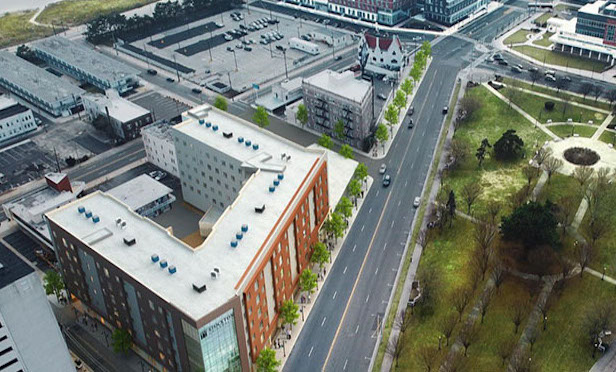 A rendering of a new student housing project by Stockton University in Atlantic City.
A rendering of a new student housing project by Stockton University in Atlantic City.
ATLANTIC CITY, NJ—The Board of Trustees of Stockton University has approved the second phase of a more than $60-million student housing plan in Atlantic City.
At a special meeting last week, the board authorized the university administration to negotiate a public/private partnership with the Atlantic City Development Corp. for the development and financing for the phase two housing project.
In its announcement, the university noted that the trustees' approval was contingent on the State of New Jersey appropriating at least an additional $5 million in annual state aid to the university to support the ongoing academic and operating costs associated with the phase two project and Atlantic City operations.
The university states that the funding for the project would be in addition to any funding the state deems appropriate to promote funding equity among the four-year public comprehensive and research universities.
University president Dr. Harvey Kesselman noted that Stockton, along with Montclair State University, currently receive the lowest funding from the state per full-time student among the four-year public comprehensive and research universities.
Stockton University Atlantic City opened in the fall of 2018. It includes a 56,000-square-foot Academic Center, a residential complex with 535 beds, and a parking garage. The project developer, ACDevco, is proposing to build a new six-story, 405-bed residential complex on property adjacent to the campus on Atlantic Avenue.
Currently the university has housing for 3,484 students at both the Galloway and Atlantic City campus. In fall 2018 the occupancy rate was 98%. The residential complex in Atlantic City is projected to be at capacity for fall 2019. Based on current and projected enrollment, the university will need additional housing in the 2021-22 academic year, the university states.
In testimony before the Assembly Budget Committee in May, Kesselman requested a $5-million increase in its annual appropriation in recognition of the university's substantial investment in Atlantic City and New Jersey's students.
“We are hopeful that the state will continue its investment in Atlantic City towards establishing an Eds & Meds corridor critical for the city's future, while stemming the outmigration of New Jersey students,” Kesselman said. “We are proud to play a role in this initiative but cannot proceed without corresponding state funding.”
“The legislature's and the governor's support are critical for this project to proceed,” he said.
© Touchpoint Markets, All Rights Reserved. Request academic re-use from www.copyright.com. All other uses, submit a request to [email protected]. For more inforrmation visit Asset & Logo Licensing.







